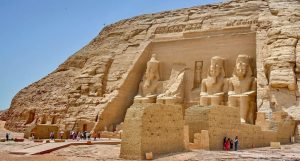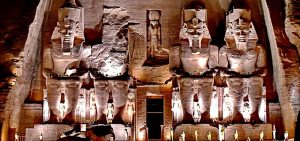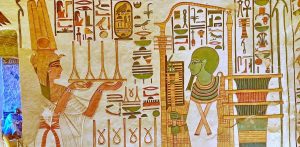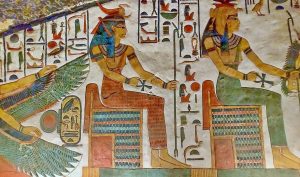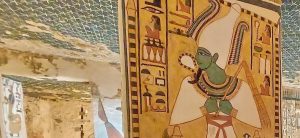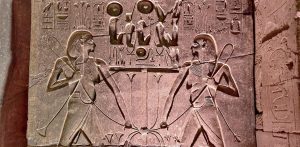There is no doubt that civilization was invented in ancient Egypt which produced important events. Ancient Egypt has a rich and fascinating history spanning thousands of years.
From the construction of incredible pyramid structures to the discovery of important scientific and medical advancements, there are countless events that have shaped the course of Egypt’s civilization.
In this article, we will explore 10 Important Events in Ancient Egypt and their impact on the development of this remarkable culture. By examining these key events, we can gain a deeper understanding of the legacy that ancient Egypt has left behind, and the ways in which it continues to influence our world today.
10 Important Events in Ancient Egypt
The 10 Important Events in Ancient Egypt are all based on the sunrise and the sunset, which were the most important events in ancient Egypt. This experience prompted them to reflect on life and the hereafter.
They are given life when the sun rises, but this life is taken away when the sun sets, and then the sun rises again to give them fresh life, which is called resurrection.
We think that civilization was founded on this truth, and God, according to the ancient Egyptians, is the sun. This sun was educating them through some people as well as certain animals, which explains why animals were divine in ancient Egypt, since these animals, as well as some humans, were God’s messengers. Based on this fact, we will talk about the most important 10 events in the religion of ancient Egypt.
There were many important events and festivals in ancient Egypt. Ancient Egyptians celebrated a number of significant occasions and holidays because each city has a unique festival related to its divine trinity.
For instance, they commemorated the marriage of the sacred Ptah and Sekhmet in Memphis and the god Amun-re and his wife the sacred Mut in Luxor. In the north, there was also a festival honoring the sacred cat Bastet, and in Kom Ombo and the Fayoum Oasis, there was a festival honoring the crocodile.
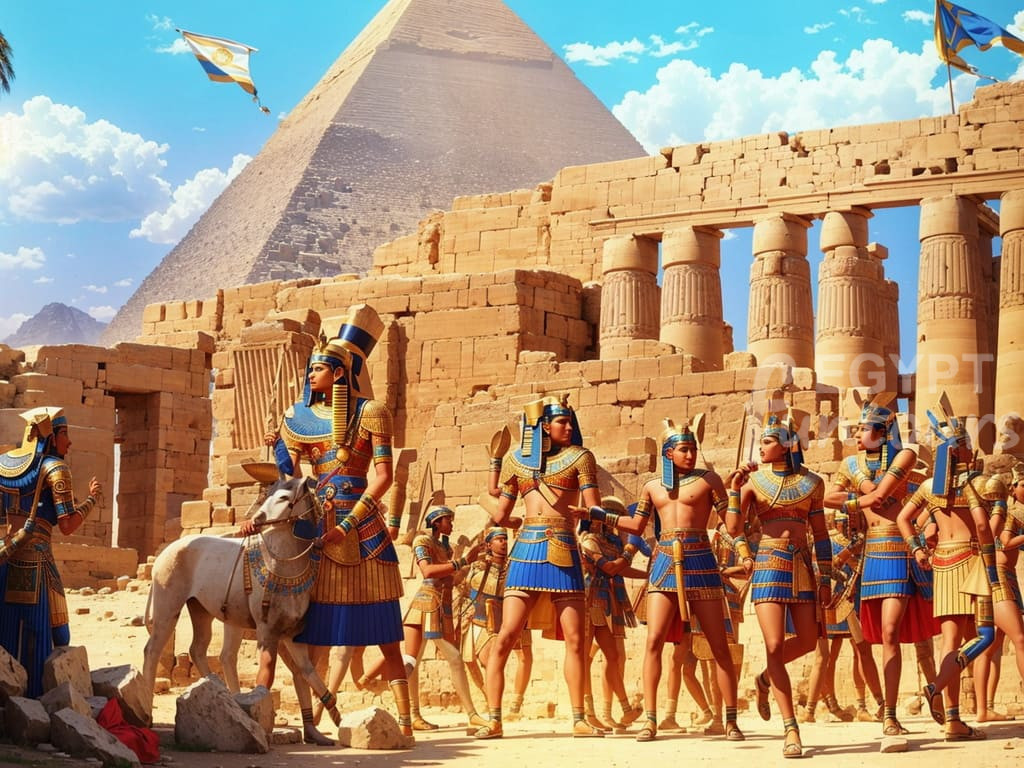
List of the 10 Important Events in Ancient Egypt
1. The Birth of God Re
The ancient Egyptians developed a belief that the sun was the creator deity and that it was in command of life and death as it rose and set. However, it was thought that mother nature gave birth to the Sun, hence its birthday was significant, and it was treated as the most important day of all time!
The ancient Egyptians planned to spend that day in the expansive temple courtyard, where they sang and danced, so they set out early in the morning to the temples with offerings and treats.
The sun chanting continues all day long until sundown, at which point they return home and enjoy a sumptuous dinner before retiring for the night. This ceremony was held in the principal temples of every city in Egypt.
2. The Birth of God Horus
Since God Horus was thought to be the grandson of God Re, he also served as the sun god. Given that it mimics the birth of Re, the supreme god of ancient Egypt, the birth of Re was one of the most significant occasions in Egyptian history.
One of the five most significant holidays in ancient Egypt was the birth of Horus, which was commemorated on the first day of month 13 every year.
The year was split into 13 months by the ancient Egyptians, 12 of which had 30 days and the last month had just 5 days, for a total of 365 days.
They celebrated the birth of the primary deity Horus on the first day of the last month, which is equivalent to our 25th of December.
The ancient Egyptians prepared turkeys for this occasion, gave gifts to the children, and lit up the temple, especially the obelisks.
3. The Coronation of the King
The birth of the son of god, who is represented in the King, is second in importance to the birth of god. One of the titles of every ancient Egyptian monarch is that he is the son of Re and he is also Horus.
God Horus is the son of god and he is also the god himself since he is the flesh of god. Ancient Egypt celebrated the coronation of the king. At this time, every Egyptian flocked to the temples to honor God for sending them such a magnificent King.
4. The Construction of the Temple
The celebration of the temple’s construction, which took place when the King went to the temple to honor the gods by announcing the start of building new sections, chapels, or obelisks for the god, was crucial because everyone in ancient Egypt contributed to the temple’s construction either by working on it or by giving offerings.
5. The Wedding of Amun and Mut
The union of God Re and Goddess Mut ranks among the most significant occasions in the history of ancient Egypt. This occurrence was thought to be the catalyst for human reproduction.
Since humans married in order to procreate, the wedding symbolizes the continuation of mankind on earth. As a result, the ancient Egyptians observed this occasion, and it was followed by the journey to Kaba the grandest festival.
Small boats loaded with goodies were carried outside by the Egyptians to rejoice, and they frequently visited the temples to make offerings to God. Between the Karnak Temple of God Amun-Re and the Luxor Temple of goddess Mut, they strolled down Sphinx Avenue.
This festival is one of the ancient Egyptian festivals that was not stolen, which is why people in Luxor continue to celebrate it, in the same way, today when they take little boats and pass the walkway between the two temples.
6. The Wedding of Horus and Hathor
Similarly, as previously said, Horus is the precise image of Re, the Sun Creator deity, as the ancient Egyptians believed. The marriage of God Horus and Goddess Hathor was treated similarly to the marriage of God Amun-Re and Goddess Mut.
The priests took boats from the Temple of God Horus in Edfu and sailed down the Nile River to the Temple of Goddess Hathor in Dendara, where they took the golden statue of Goddess Hathor, and then sailed back to Edfu, where they left both Horus and Hathor for a week on the Temple’s rooftop to receive the blessing of their father, the Sun God Re.
7. The New Year
The New Year’s celebration is the year’s last event, falling on December 31st. The ancient Egyptians observed this day by visiting temples and honoring God Re and all of its holy messengers.
There was a holy character for each temple. The ancient Egyptians exchanged well wishes for the new year, and they also chatted about their accomplishments from the previous year; they even informed God about everything excellent they had accomplished in the previous year.
8. Heb-Sed Event
This was one of the most significant occurrences in ancient Egypt. The event’s name literally translates as “The Festival of the Tail,” since the monarch places a ceremonial tail of an animal to symbolize physical strength.
Officially, the event was celebrated every 30 years of the king’s reign, however, due to the length of time, most ancient Egyptian rulers held it every 4 years. This occurrence is comparable to our current presidential elections.
The monarch attaches an animal’s tail to him, and he must demonstrate that he is still youthful and powerful enough to remain in his position. The King must pass many pre-planned exams, including:
- Running around the large court of the palace for specific rounds
- Fighting wild animals like Lions
- Show that he is excellent at horse riding
- Show some acrobatic skills and Show movements
If he succeeds, the priests will strip all regal emblems from the monarch and, while he is nude, bathe his body with the sacred Nile River water and outfit him in a blain semi-transparent gown.
They then begin their prayers and the coronation of the King. He will be awarded all royal insignia, including Egypt’s double crown.
9. The Rebirth Celebration
The ancient Egyptians celebrated Osiris’ rebirth three days after the day he was murdered since it was also thought that he was resurrected from the grave after three days. In all situations, Osiris was regarded as the primary deity of the Sun, and the cosmos revolved around him.
10. The Pilgrimage to Abydos
The last of the 10 important events in ancient Egypt is the pilgrimage to Abydos “Baka” or “Kaba” which was the most significant religious occasion in ancient Egypt.
Osiris’ primary religious center in ancient Egypt Abydos, which is also said to be where his body and spirit are kept.
The term body in ancient Hieroglyphics is “Ba,” and the word soul is “Ka,” hence the name of the Abydos is either “Kaba” or “Baka,” which means “the place where the body and soul of God are found.”
During this occasion, the ancient Egyptians sacrificed lambs and made precise rounds between the tomb and the temple of the deity Osiris.
The edifice that depicted and housed Osiris’ body and spirit is today known as the Osirion, and it is the only ancient temple that has the whole version of ancient Egypt’s sacred literature.
The ancient name of the location was “Kaba” or “Baka,” and both names are referenced in the Islam religion as the area where Muslims travel to conduct Pilgrimage is the black-covered edifice known as Kaba, while the word Baka is recorded in the Qu’ran as referring to the same place.
All of the names of deities stated above are names of God’s messengers and angels, with the exception of the names of God himself, which varied over time from Re in the Old Kingdom to Amun-Re in the New Kingdom to Osiris and Horus in the late era and during the Greek period in Egypt.
Finally, after reading about the 10 most important events in ancient Egypt, we may draw parallels between Egyptian religion and Christian and Islamic religions.
Useful links:
- civilization of ancient Egypt
- egypt unesco tours
- Best Tourist Attractions
- Explore Egypt Destinations
- deluxe tours
- Different 10 important events in ancient Egypt

